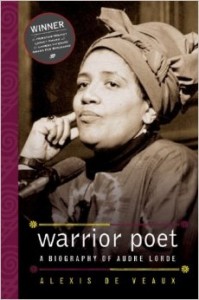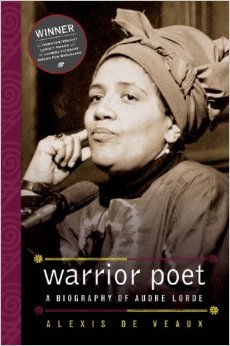 Warrior Poet: A Biography of Audre Lorde
Warrior Poet: A Biography of Audre Lorde
by Alexis De Veaux
Norton. 512 pages, $29.95
VISIONARIES are like extremists, embarrassing and annoying, making so much out of so little: they identify problems that the mediocre among us haven’t thought about and don’t want to think about. Then years after their deaths we praise them for being the first to say what now seems obvious. This is the way we treat greatness. During her lifetime, Audre Lorde (1934–1992) created a mythic identity for herself and Black lesbians in America and insisted, to the chagrin of many, that her voice be heard.
When Lorde published her first book of poems, feminists were only starting to apprehend their own oppression. Lorde was one of the first to say that there was a connection between the women’s rights movement and civil rights movement. She was the first to claim that the gay and lesbian community was a microcosm of a culture in which racism ran rampant. She connected the gay rights movement to the civil rights movement and fought for her place at the podium. She alienated whites when she talked about race, and alienated Blacks—a word she always capitalized—when she talked about sexuality. She examined the Black woman’s relationship to white women in the feminist movement, and pointed out cracks in the façade of solidarity. She refused to be a token, but tried to construct a dialogue about differences. Forty years ago Lorde identified internalized racism and homophobia, terms that are common today, because her own West Indian mother favored her lighter-skinned sisters to her, and because the Black women she encountered in bars were with white women and could not meet her eyes. Thus, according to Lorde, Black women were separated by external and internal racism and Black lesbians were outsiders among themselves. Moreover, the woman who said that “your silence will not protect you” argued that we’re spoon-fed hatred by our parents, our schools, and our culture. If we are the things we hate, black/lesbian, then that hate is internalized and manifests itself in rage. The author of Warrior Poet, Alexis De Veaux, is a poet, playwright, novelist, and the chair of the women’s studies department at the University of Buffalo, New York. In a short and serviceable introduction, De Veaux explains that she divides Lorde’s life into two lives, “before cancer” and “after cancer.” The first part starts with Lorde’s childhood in Harlem, the youngest daughter of Caribbean immigrants. African-American literature of the 1950’s and 60’s emerged from the experience of a people whose heritage and familial structures were distorted and suppressed by slavery. Blacks had been robbed of a history, so Lorde searched for her own stories, traveling to Grenada and Africa, hunting through documents to find herself through her ancestors. Inevitably, her route to selfhood led her to acknowledge her African-American heritage as well. She found that the secrets of making her identity were neither an existential decision nor genetically programmed. Instead, who she was, was produced in the fields of difference, created individually as well as collectively. As the Black lesbian literary tradition is one that had no natural existence, Lorde worked to create one. Lorde was educated at Hunter College. Her marriage to Ed Rollins, the white man who fathered her two children, was never monogamous on either side. Both had numerous lovers and at least once were involved with the same woman. Reflecting on her life in the 1960’s, Lorde claimed: “As a Black lesbian mother in an interracial marriage there was usually some part of me guaranteed to offend everybody’s comfortable prejudices.” Eventually, Lorde drifted into a relationship with a white woman named Frances Clayton. They lived together on Long Island for seventeen years, vacationing in Vermont every year, raising Lorde’s two children, traveling, and stayed together through the time of Lorde’s cancer. As with all relationships for Lorde, this one was not monogamous. She neglected to mention that to Clayton, however. While the relationship was strained at times, it seemed to meet Lorde’s needs for many years. In 1977 Lorde underwent a mastectomy. She spoke out about her feelings and experiences at the hands of the medical community in The Cancer Journals. Then, in 1981, she had an unwarranted scare about colon cancer. The incident underscored the reality that she lived in fear of cancer still. In 1983 she discovered another tumor. Somewhat in denial, Lorde tried several alternative treatments, including diet changes, but she was often too sick to eat. Eventually she went to Switzerland with Clayton and underwent noninvasive treatments. There she was eventually diagnosed with cancer of the liver. At that point she was convinced that surgery would cause the cancer to spread at a greater rate. In the end, accepting the diagnosis, Lorde left her lover of seventeen years and her restless search for a spiritual home. Saving her strength to fight for her life, she gave up trying to change the world and retreated to the island of St. Croix in 1986, where she waged her last battle with cancer. Lorde’s final years are not covered in this biography, as De Veaux stops the story at the end of Lorde’s politically active life. We are told that Lorde retired to the home of Gloria Joseph, a Black feminist in the Caribbean, until her death. Warrior Poet often reads like a suspenseful novel. De Veaux draws on personal journals, private archives of Lorde’s estate, and interviews members of Lorde’s family, friends, and lovers. However, while she sprinkles the text with poetry and now and then describes a review, she does not analyze. She simply places Lorde’s words in the context of her life. While the author gives us even the most mundane events, she also leaves critical gaps. Lorde’s teaching is documented, but the reader knows nothing of her students, what she taught or learned while teaching. The colleges where she worked are made to appear as simply a means of financial reward. Lorde’s experiences and feelings about this work are omitted. Lorde maintained erotic friendships with activists and poets who formed and shaped her work. Yet she had a persistent, haunting feeling of being an outsider. She left a cultural legacy, personifying the civil rights struggles of the 20th century. She taught us not to generalize the human experience, and reminded us that there’s a price for silence. She fought by word and deed to have us honor our beginnings, to make them part of our present. Her writings became internationally recognized as she continued to articulate her ideas on race, sexuality, and gender in new ways, eventually documenting her own personal struggle with breast cancer. With so much of our history written by and about white men, the perspective in Warrior Poet has great value as a chronicle of a life during a time of growing enlightenment. Audre Lorde died at age 58 in 1992.





